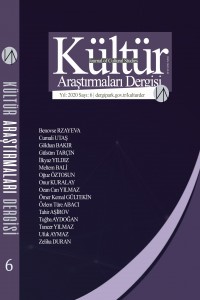Masumların Savaşı ve Gücün Zaferi: Birinci Dünya Savaşı ve Theatre Workshop’un "Oh What A Lovely War"u
Öz
Anahtar Kelimeler
Oh What a Lovely War Joan Littlewood Theatre Workshop Birinci Dünya Savaşı Sınıf Çatışması
Kaynakça
- Bond, Brian (2002). The Unquiet Western Front: Britain’s Role in Literature and History. Cambridge: Cambridge University Press.
- Holdsworth, Nadine (2007). “Spaces to Play/Playing With Spaces: Young People, Citizenship and Joan Littlewood.” Research in Drama Education. 12.3: 393-304. Retrieved from https://8pic.ir.
- Holdsworth, Nadine (2006). Joan Littlewood. New York: Routledge.
- Innes, Christopher (2002). Modern British Drama: The Twentieth Century. New York: Cambridge University Press.
- Kosok, Heinz (2007). The Theatre of War: The First World War in British and Irish Drama. New York: Palgrave Macmillan.
- Luckhurst, Mary (2006). “A Wounded Stage: Drama and World War I.” A Companion to Modern British and Irish Drama: 1880-2005. (Edt. Mary Luckhurst). Singapore: Blackwell Publishing.
- Paget, Derek (1990). “Oh What a Lovely War: the Texts and Their Con-text.” New Theatre Quarterly. 6.23: 244-260.
- Paget, Derek (2004). Case Study: Oh What a Lovely War.” The Cambridge History of British Theatre: Since 1895. (Ed. Baz Kershaw). Cambridge: Cambridge University Press.
- Patterson, Michael (2005). The Oxford Dictionary of Plays. New York: Ox-ford University Press.
- Prentki, Tim, and Selman, Jan (2000). Popular Theatre in Political Culture. Bristol: Intellect Books.
- Rabey, David Ian (2003). English Drama Since 1940. Malaysia: Pearson Education Limited.
- Taylor, R. Norton (2008). “MI5 surveillance of Joan Littlewood during war led to two-year BBC ban.” The Guardian, 4 March 2008: Main Section p. 9.
- Theatre Workshop (1965). Oh What a Lovely War. London: Methuen.
The War of the Innocent and the Victory of the Power: The Great War and "Oh What a Lovely War" by Theatre Workshop
Öz
The First World War, which many consider to be the most significant milestone in the history of humanity, ushered in a new age and shaped the borders of many brand-new countries. Not only in England but also in many other parts of the world, the war is remembered for its destruction of an oppressed class at the hands of distant yet controlling capitalists. This distinction between the classes constituted the basic theme of the masterpiece by Joan Littlewood and Theatre Workshop; Oh What a Lovely War, which ran a new movement and a new approach to the theatre traditions in Britain. The work was incredibly adept in taking the advantages of Brechtian stage techniques while depicting the distance of a ruling class from the realities of the War. Despite the censorship of the English Government, Theatre Workshop caused a stir across the nation and later, the play was staged in the West End and on Broadway, and it received numerous prestigious awards. This study focuses on the class struggle between the soldiers and officers during World War I, the atrocities of the War, the economic and political dimensions of the War and Joan Littlewood’s approach to these issues within the context of Oh What a Lovely War by Theatre Workshop.
Anahtar Kelimeler
Oh What a Lovely War Joan Littlewood Theatre .workshop World War One Class Struggle
Kaynakça
- Bond, Brian (2002). The Unquiet Western Front: Britain’s Role in Literature and History. Cambridge: Cambridge University Press.
- Holdsworth, Nadine (2007). “Spaces to Play/Playing With Spaces: Young People, Citizenship and Joan Littlewood.” Research in Drama Education. 12.3: 393-304. Retrieved from https://8pic.ir.
- Holdsworth, Nadine (2006). Joan Littlewood. New York: Routledge.
- Innes, Christopher (2002). Modern British Drama: The Twentieth Century. New York: Cambridge University Press.
- Kosok, Heinz (2007). The Theatre of War: The First World War in British and Irish Drama. New York: Palgrave Macmillan.
- Luckhurst, Mary (2006). “A Wounded Stage: Drama and World War I.” A Companion to Modern British and Irish Drama: 1880-2005. (Edt. Mary Luckhurst). Singapore: Blackwell Publishing.
- Paget, Derek (1990). “Oh What a Lovely War: the Texts and Their Con-text.” New Theatre Quarterly. 6.23: 244-260.
- Paget, Derek (2004). Case Study: Oh What a Lovely War.” The Cambridge History of British Theatre: Since 1895. (Ed. Baz Kershaw). Cambridge: Cambridge University Press.
- Patterson, Michael (2005). The Oxford Dictionary of Plays. New York: Ox-ford University Press.
- Prentki, Tim, and Selman, Jan (2000). Popular Theatre in Political Culture. Bristol: Intellect Books.
- Rabey, David Ian (2003). English Drama Since 1940. Malaysia: Pearson Education Limited.
- Taylor, R. Norton (2008). “MI5 surveillance of Joan Littlewood during war led to two-year BBC ban.” The Guardian, 4 March 2008: Main Section p. 9.
- Theatre Workshop (1965). Oh What a Lovely War. London: Methuen.
Ayrıntılar
| Birincil Dil | İngilizce |
|---|---|
| Konular | Sanat ve Edebiyat |
| Bölüm | Araştırma Makaleleri |
| Yazarlar | |
| Yayımlanma Tarihi | 15 Eylül 2020 |
| Yayımlandığı Sayı | Yıl 2020 Sayı: 6 |


